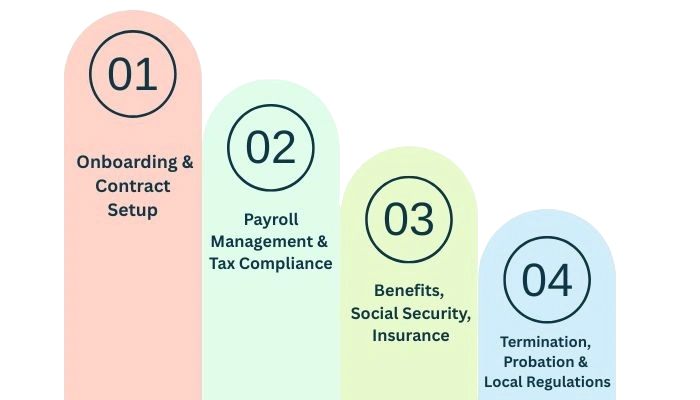Build your team in Portugal without setting up a local entity. Remire’s Employer of Record (EOR) services in Portugal let you hire, pay, and manage employees legally and efficiently, while we handle all the local compliance, contracts, payroll, and benefits for you.
What Is an EOR in Portugal?
An Employer of Record (EOR) is a third-party organization that legally employs your workers in Portugal on your behalf.
You manage the employee’s daily work, while the EOR takes care of everything else, from employment contracts and payroll to tax filings and social security registration.
This gives your business the freedom to hire top Portuguese talent quickly, compliantly, and without the complexity of opening a local entity.
How EOR Portugal Compares to Other Models (PEO, Contractor)
| Model | Legal Employer | Entity Required | Ideal Use Case |
|---|---|---|---|
| EOR (Employer of Record) | EOR provider | No | Hire in Portugal without entity setup |
| PEO (Professional Employer Organization) | Shared (co-employment) | Yes | Companies with an existing local entity |
| Contractor Model | Self-employed individual | No | Short-term or freelance work (higher misclassification risk) |
Why Use an Employer of Record in Portugal
Benefits — Speed, Compliance, No Entity Needed
- Hire in days, not months: EORs like Remire already have a registered Portuguese entity, so you can onboard employees immediately.
- Full compliance: All payroll, tax, and labor laws handled by experts familiar with Portugal’s employment code.
- No legal entity required: Avoid the costs and delays of establishing a branch or subsidiary.
- Localized benefits: Employees receive benefits and protections required under Portuguese law.
- Lower risk: The EOR assumes responsibility for compliance, protecting your business from penalties or disputes.
Risks & Considerations
While EORs simplify expansion, choosing the right partner is crucial. Cheap, generic providers may:
- Mismanage local compliance or filings
- Offer inflexible contracts or limited benefits
- Lack of in-country support or legal expertise
Remire mitigates these risks through local HR specialists, Portuguese legal counsel, and dedicated account managers for every client.
How Remire’s EOR Portugal Works

Onboarding & Contract Setup
We draft bilingual (Portuguese and English) employment contracts that meet local labor code standards. Remire registers each employee with Segurança Social and tax authorities before their start date.
Payroll Management & Tax Compliance
Our payroll team handles monthly salary calculations, withholdings, bonuses (holiday & Christmas pay), and submissions to Portuguese authorities, ensuring 100% compliance.
Benefits, Social Security, Insurance
We manage statutory benefits including paid leave, sick pay, parental leave, and public holidays, as well as optional add-ons such as health insurance and meal allowances.
Termination, Probation & Local Regulations
Remire ensures fair and compliant termination processes, following proper notice periods, severance calculations, and probation rules as defined by the Portuguese Labor Code.
Local Employment Laws & Compliance in Portugal
Employment Contracts & Required Clauses
Written contracts are mandatory for fixed-term and part-time employees and strongly advised for all. They must outline:
- Role, salary, and benefits
- Working hours and conditions
- Termination clauses
- Applicable collective bargaining agreements
Contracts should be drafted in Portuguese (with English translation if needed) and aligned with the Portuguese Labor Code (Código do Trabalho).
Social Security & Contributions
Employers contribute 23.75%, and employees contribute 11% of gross salary toward social security. All employees must be registered before their first working day, with monthly payroll declarations filed electronically.
Leave, Overtime, Working Hours, Termination Rules
- Workweek: 40 hours (8 hours/day maximum)
- Paid Leave: 22 vacation days + 13 public holidays
- Overtime: Paid at 125–137.5% or time off in lieu
- Notice Periods: 15–60 days, depending on tenure
- Severance: ~12 days’ pay per service year (capped)
Data Protection, Local Registrations, Labor Code
Remire ensures all employee data management follows GDPR and Portuguese privacy law. We handle required registrations and maintain audit-ready records for local authorities.
Use Cases & Who Should Use EOR Portugal
Startups Expanding to Portugal
Test the market, hire your first team members, and operate compliantly without setting up a company.
Remote Teams in Europe
Easily employ remote Portuguese professionals while managing everything through a single global platform.
Companies Entering Portugal as Pilot Market
Run a pilot operation, validate your business model, and scale confidently once results prove successful.
EOR Portugal vs Entity Setup / DIY Hiring
Cost Comparison
Setting up a company in Portugal can take up to three months and involves legal, accounting, and administrative expenses. With Remire’s EOR, you avoid these upfront costs and ongoing compliance overhead.
Risk & Compliance Tradeoffs
| Model | Control | Risk | Time to Hire | Compliance Burden |
|---|---|---|---|---|
| Entity Setup | Full | High | 2–3 months | Complex |
| EOR Portugal | Shared | Low | 1–2 weeks | Minimal |
| Contractor Hiring | Partial | Medium | Fast | Risk of Misclassification |
Frequently Asked Questions
How Much Does EOR Service in Portugal Cost?
Pricing depends on role type, benefits, and volume. Contact Remire for a custom quote.
Is EOR Hiring Legal in Portugal?
Yes, EOR hiring is fully legal and regulated under Portuguese labor laws.
What Services Are Included in EOR Portugal?
Remire covers contracts, onboarding, payroll, tax filings, benefits administration, and compliant offboarding.
Contact Remire to Set Up EOR in Portugal
Hire employees in Portugal legally, quickly, and without bureaucracy.

